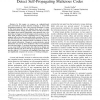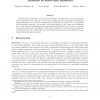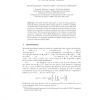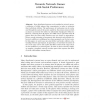222 search results - page 5 / 45 » Equilibria for Networks with Malicious Users |
ICC
2007
IEEE
14 years 1 months ago
2007
IEEE
— In this paper, we propose an endpoint-based joint network-host anomaly detection technique to detect selfpropagating malicious codes. Our proposed technique is based on the obs...
STACS
1999
Springer
13 years 11 months ago
1999
Springer
We investigate the problem of routing traffic through a congested network in an environment of non-cooperative users. We use the worst-case coordination ratio suggested by Koutsou...
ACNS
2006
Springer
13 years 11 months ago
2006
Springer
Abstract. We study the impact of malicious synchronization on computer systems that serve customers periodically. Systems supporting automatic periodic updates are common in web se...
ISAAC
2005
Springer
14 years 26 days ago
2005
Springer
We study network load games, a class of routing games in networks which generalize selfish routing games on networks consisting of parallel links. In these games, each user aims t...
SIROCCO
2010
13 years 8 months ago
2010
Many distributed systems can be modeled as network games: a collection of selfish players that communicate in order to maximize their individual utilities. The performance of such ...




